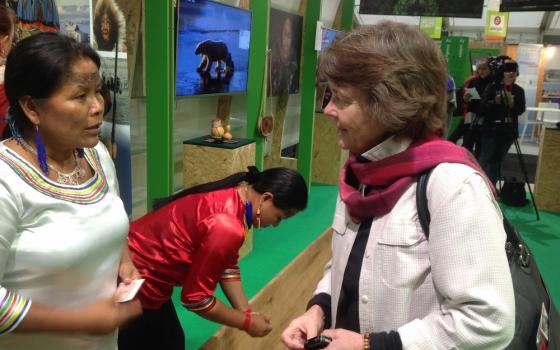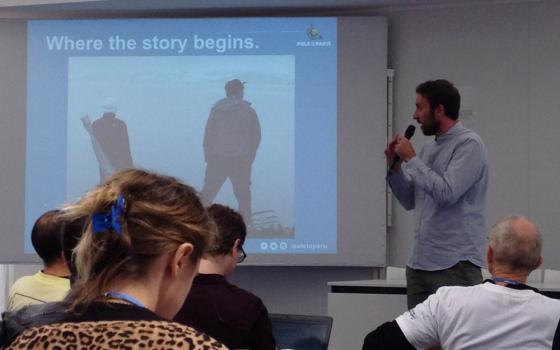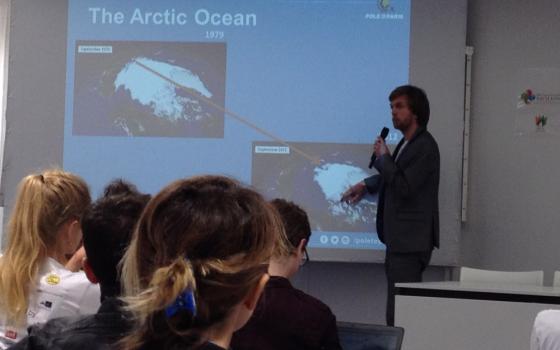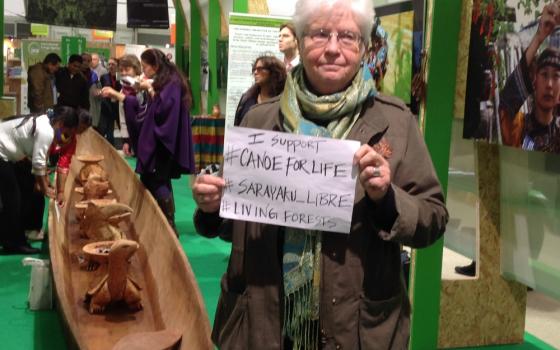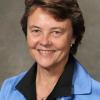For most people climate change is a scientific abstraction posing a distant threat. "It's in the Arctic or distant in time," said Dan Price, an English climate scientist in his 20s, speaking in the "green" Climate Generations area adjacent to the official "blue" area where the COP21 climate negotiations are taking place.
He and fellow climatologist, Norwegian Erlend Moster Knudsen, also in his 20s, had just arrived in Paris three days earlier, completing a "Pole to Paris" journey of 15,000 kilometers. Knudsen ran 3,000 km south from the northern tip of Norway; Price bicycled 12,000 km north from southern New Zealand.
The young men had each completed a doctorate in climate science last year — Price specializing in the Antarctic and Knudsen in the Arctic — and both turned down research positions in their fields to undertake this project.
"It rose out of frustration with the lack of understanding of the urgency of the situation," Knudsen said, noting the huge gap between the current 99-percent consensus among climate scientists that human-induced climate change is occurring and the 57 percent of the public who accept that finding.
"For scientists," he said, "the only debate is over how fast the change will occur."
"We put everything we could into this year — to raise awareness," Price said. On the journey, both men gave talks and presentations about climate change, hearing and sharing stories about its impact. "In Bangladesh we're talking about millions of people on the frontlines of climate change. One woman I met has already had to move three times because of rising waters. The crisis of refugees we're seeing now will pale in comparison if we don't act," he added.
"We gave it everything we had because we don't think the stakes could be any higher," said Price. Although neither man knows the precise next steps, both have decided that communicating the urgency of our global predicament is more important than doing the science.
"We need to make sure this goes beyond COP21," said Price. "Personal stories is what this scientific narrative is missing. We believe that as more people hear the stories and talk about it, it will impact politicians."
For indigenous leaders, the key is not only to tell the personal stories but also to share ways of living that will bring humanity back from the brink of disaster into right relationship with Earth and all beings. On Sunday, in the heart of Paris, an all-indigenous flotilla of kayaks floated down the Bassin de la Villette canal in a symbolic joining of all waters of the world, to the sound of cries and chants from other indigenous standing over a bridge.
The ceremony was followed by a press conference of indigenous of the Americas — "frontline communities" that are among the first to feel the effects of climate change. They joined to tell their stories and demand real climate solutions, offering initiatives drawing on indigenous knowledge, culture and spirituality.
Among the initiatives were the launching of a declaration by indigenous peoples, signed by over 150 organizations, calling on world leaders to keep fossil fuels in the ground; the signing of a treaty by indigenous women leaders from North and South America who have joined to protect Mother Earth; and the presentation of the Kawsak Sacha, "Living Forest," proposal by the Kichwa people of Sarayaku.
To symbolize the "Living Forest" and the resilience of indigenous people, the Kichwa crafted a "Canoe of Life," bringing it 6,000 miles from the Amazon to Paris. The 20-foot-long canoe, carved from a Pinchi tree native to the rainforest, began its voyage on the Wira Kaspi River in the heart of the Ecuadoran Amazon. After floating on the waters of the Bassin de Villette in Paris, it was brought to the Indigenous Pavilion in the COP21 Climate Generations site to represent "an alternative to the materialist western vision — one that can suggest a form of 'good living' (sumac kawsay or buen vivir) for a planet in the midst of a global ecological crisis."
[Adrian Dominican Sr. Elise D. García is director of communications for her congregation and the former co-director of Santuario Sisterfarm, an ecology center in the Texas Hill Country dedicated to cultivating cultural and biological diversity. Follow her on Twitter: @elisegarciaop.]
Elise D. García is blogging for GSR from the United Nations Climate Change Conference in Paris, France, Nov. 30-Dec. 11, 2015. Find all the GSR COP21 coverage here.
